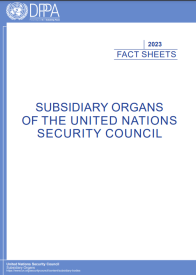Committees, Working Groups and Ad Hoc Bodies
All existing committees and working groups are comprised of the fifteen members of the Council. While standing committees are chaired by the President of the Council, rotating on a monthly basis, other committees and working groups are chaired or co-chaired by designated members of the Council who are announced on an annual basis by a Note of the President of the Security Council.
Article 29 of the United Nations Charter sets out that the Security Council may establish subsidiary bodies as needed for the performance of its functions. This is also reflected in Rule 28 of the Council’s Provisional Rules of Procedure.
All existing committees and working groups are comprised of the fifteen members of the Council. While standing committees are chaired by the President of the Council, rotating on a monthly basis, other committees and working groups are chaired or co-chaired by designated members of the Council who are announced on an annual basis by a Note of the President of the Security Council.
The mandate of subsidiary organs, whether they are committees or working groups, can range from procedural matters (e.g. documentation and procedures, meetings away from headquarters) to substantive issues (e.g. sanctions regimes, counter-terrorism, peacekeeping operations).
The International Criminal Tribunal for the former Yugoslavia (ICTY) and the International Criminal Tribunal for Rwanda (ICTR) are subsidiary organs of the Security Council within the terms of article 29 of the Charter. As such they are dependent on the UN in administrative and financial matters, although as judicial institutions, they are independent of any one State or group of States, including their parent body, the Security Council.
Committees
Guided by Security Council resolutions 1373 (2001) and 1624 (2005), the Committee works to bolster the ability of United Nations Member States to prevent terrorist acts both within their borders and across regions. It was established in the wake of the 11 September terrorist attacks in the United States.
On 28 April 2004, the United Nations Security Council unanimously adopted resolution 1540 (2004) under Chapter VII of the United Nations Charter which affirms that the proliferation of nuclear, chemical and biological weapons and their means of delivery constitutes a threat to international peace and security.
United Nations Military Staff Committee
The Military Staff Committee helps plan UN military measures and regulate armaments.
The use of mandatory sanctions is intended to apply pressure on a State or entity to comply with the objectives set by the Security Council without resorting to the use of force. Sanctions thus offer the Security Council an important instrument to enforce its decisions. The universal character of the United Nations makes it an especially appropriate body to establish and monitor such measures.
The Council has resorted to mandatory sanctions as an enforcement tool when peace has been threatened and diplomatic efforts have failed. The range of sanctions has included comprehensive economic and trade sanctions and/or more targeted measures such as arms embargoes, travel bans, financial or diplomatic restrictions.
Standing Committees and Ad Hoc Bodies
United Nations Compensation Commission
The Commission was created in 1991 as a subsidiary organ of the United Nations Security Council(link is external) under Security Councilresolution 687 (1991) to process claims and pay compensation for losses and damage suffered as a direct result of Iraq’s unlawful invasion and occupation of Kuwait in 1990-91.
Working Group established pursuant to resolution 1566 (2004)
In accordance with paragraphs 9 and 10 of Security Council resolution 1566 (2004) the Working Group is tasked to examine a) "practical measures to be imposed upon individuals, groups or entities involved in or associated with terrorist activities, other than those designated by the Al-Qaida/Taliban Sanctions Committee" and b) "the possibility of establishing an international fund to compensate victims of terrorist acts and their families".
Working Group on Peacekeeping Operations
The Security Council Working Group on Peacekeeping Operations was established pursuant to a decision of the Security Council contained in a statement by its President (S/PRST/2001/3) made at the Council’s 4270th meeting on 31 January 2001. In the statement, the Council reiterated its agreement to hold consultations with troop-contributing countries in a timely manner at different stages of a United Nations peacekeeping operation.
Working Group on Children and Armed Conflict
The Security Council Working Group pursuant to resolution 1612 (2005) reviews reports on violations against children affected by armed conflict committed by parties that are listed in the annexes to the Secretary-General’s report on children and armed conflict.
Ad Hoc Working Group on Conflict Prevention and Resolution in Africa
The ad hoc Working group on Conflict Prevention and Resolution in Africa has its origins in the Statement by the President of the Security Council of 31 January 2002 (S/PRST/2002/2), in which the Security Council recognized the need for adequate measures to prevent and resolve conflicts in Africa, and expressed its intention to consider setting up an ad hoc Working Group to monitor the recommendations contained in the same Presidential statement.
Working Group on Documentation and Other Procedural Questions
The Security Council Informal Working Group on Documentation and Other Procedural Questions (IWG) was established in June 1993 to improve the process by which the Security Council addresses issues concerning its documentation and other procedural questions.
International Courts and Tribunals
The International Residual Mechanism for Criminal Tribunals (“Mechanism”) was established pursuant to resolution 1966 (2010) of 22 December 2010 by the Security Council and is mandated to continue a number of essential functions previously carried out by the International Criminal Tribunal for Rwanda (“ICTR”) and the International Criminal Tribunal for the former Yugoslavia (“ICTY”), subject to the provisions of the same resolution and the Statute of the Mechanism.

